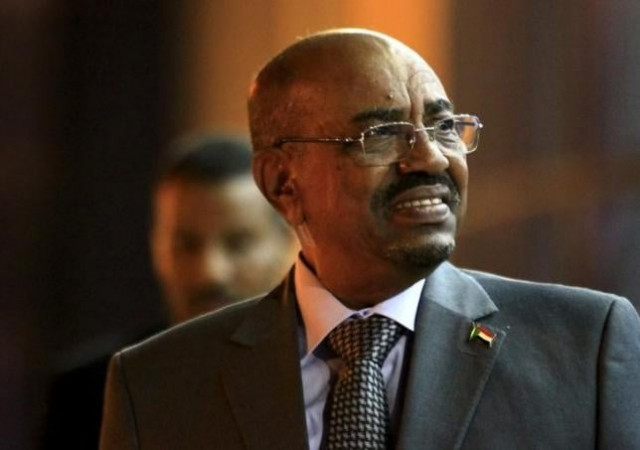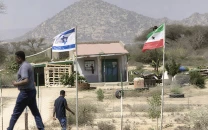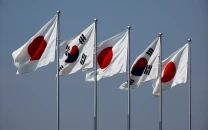Seeking support, Sudan moves closer to Riyadh amid spat with Iran
Sudan has cut ties with Tehran as a response to attacks on Saudi diplomatic missions in Iran

Omar al-Bashir. PHOTO: REUTERS
The impoverished east African state followed Riyadh in severing relations with Iran, saying it was responding to attacks on Saudi diplomatic missions in Iran after the execution of a Saudi Shia cleric.
Saudi Shia protesters shout ‘death’ to ruling family
But with Khartoum hungry for Saudi investment to boost its battered economy, the move was made for "pragmatic reasons", said Al-Tayeb Zein al-Abidine, political science professor at Khartoum University.
It follows Sudan's surprise decision in March to send troops to join the Saudi-led coalition against Yemen's Shia Huthi rebels.
"The government realised it was very isolated, even within the Arab world, and decided to change sides," Abidine said.
Iran willing to join peace talks
President Omar al-Bashir's 26-year rule has seen Sudan slapped with sanctions over rights abuses and its support for Islamic extremists, including Osama bin Laden.
Bashir himself is wanted on war crimes charges related to the insurgency in the western region of Darfur.
Ties with the Gulf disintegrated over Khartoum's support of the 1991 Iraqi invasion of Kuwait, leaving Sudan to turn to Iran, also isolated and hit by sanctions.
Reports said Tehran supplied Sudan with ammunition and small arms, helping to develop its arms industry.
Iranian warships used to stop over in Port Sudan across the Red Sea from Saudi Arabia.
But it was a "relationship of convenience", said Magdi El Gizouli, an independent analyst. "I don't think there's a strong ideological commitment," he said.
The partnership soured in September 2014, when Sudanese officials ordered the closure of an Iranian cultural centre in Khartoum, accusing its employees of preaching Shia Islam in majority Sunni Sudan.
Observers saw underlying motives.
"They closed the centres to give a positive signal to Saudi Arabia," a diplomatic source in Khartoum told AFP.
The closure came with the economy faltering after nearly 20 years of sanctions.
When South Sudan became independent in 2011, it took with it three quarters of the country's oil reserves.
And Sudan's lifting of fuel subsidies triggered street protests in September 2013, in one of the most serious challenges to Bashir's rule since he seized power.
"The main driver of foreign relations is the situation of the 'bank of Sudan'," said Gizouli, referring to the overall state of the country's economy.
Saudi-Iran row: Pakistan will put its own interests first, says Sartaj Aziz
Sudan made a firmer commitment to Riyadh and its Gulf allies in March when it joined the coalition, despite fighting insurgencies in the western Darfur region and South Kordofan and Blue Nile states.
Its troops have reportedly been active in combat roles in Yemen and Sudanese troops have been filmed driving in convoy through the southern port of Aden.
In August, Sudan said it had received a $1 billion deposit in its central bank, with media reports at the time saying it was aimed at shoring up Sudan's foreign reserves.
Foreign ministry spokesman Ali al-Sadiq denied Sudan's "very good relations" with Riyadh were driven by financial and economic motives.
"The flow of investments has (been) coming all the time," he said.
But since Sudan's rapprochement with Riyadh and its Gulf allies, officials have been promising there will be more Saudi investment in the country.
The investment minister told parliament last week that Saudi investments in Sudan were worth $11 billion.
And after Sudan cut ties with Iran, the deputy head of its mission in Riyadh met the head of the Saudi chamber of commerce to discuss more financial and economic projects.
The diplomatic change of course is also likely to prove popular with the families of the hundreds of thousands of Sudanese workers living in the Gulf.
"They give support to many families in Sudan, so mending relations with the Gulf was a very popular step," Abidine said.
In March 2014, Saudi banks stopped dealing with Sudan, hitting the workers sending remittances back badly.
Following Sudan's decision to join the war in Yemen, officials said the measures could be eased.
There has been little improvement in Sudan's economy since its attempted rapprochement, and Riyadh is also facing uncertainties due to the slump in oil prices.
Saudi-iran row: Pakistan, Turkey urged to help end crisis
But Sudan is still banking on its backing.
Khartoum may also hope Riyadh will lobby Washington over its sanctions regime, the removal of which would also lift the economy.
"All countries lead a foreign policy in line with their interests," the diplomatic source in Khartoum said. "Sudan's interest now is economic."



















COMMENTS
Comments are moderated and generally will be posted if they are on-topic and not abusive.
For more information, please see our Comments FAQ